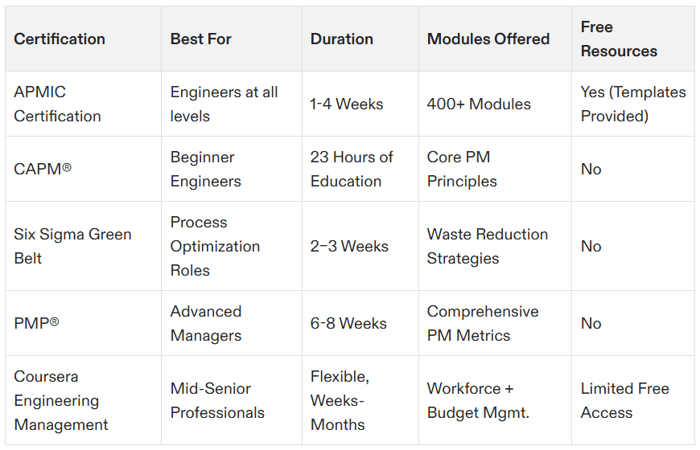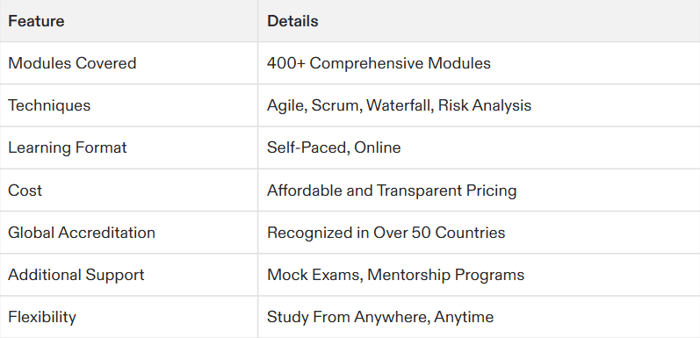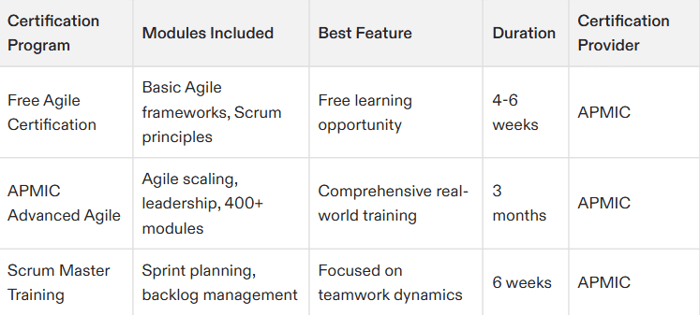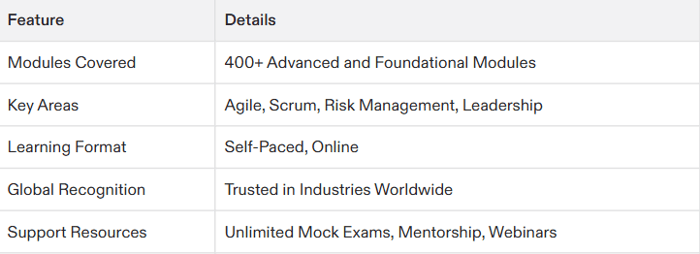Table of Contents
- Introduction
- Why Is an Engineering Project Management Certification Important?
- What to Look for in an Engineering Project Management Certification
- Popular Engineering Project Management Certification Options
- Key Advantages of APMIC’s Engineering Certification
- How to Fast-Track Your Certification
- FAQs About Engineering Project Management Certification
- 1. What is the best engineering project management certification?
- 2. Is it worth getting an engineering project management certification?
- 3. Can I earn an engineering project management certification online?
- 4. How long does an engineering certification take?
- 5. Does APMIC provide industry-specific modules for engineers?
- Informative Certification Comparison Table
- Final Thoughts
Introduction
Engineering projects are some of the most complex and detail-driven undertakings in the professional world. From designing skyscrapers to creating groundbreaking technologies, effective project management determines how well these endeavors succeed. An engineering project management certification can help you master the skills needed to lead such projects confidently and efficiently.
This blog post dives deep into everything you need to know about engineering project management certification, including its importance, the best programs available, and why APMIC’s offering is a game-changer with 400+ customized modules. Whether you're an engineer transitioning into project management or a seasoned manager looking to upgrade your credentials, this guide has you covered.
Why Is an Engineering Project Management Certification Important?
Unlike general project management certifications, those designed specifically for engineering focus on technical precision, resource management, and cross-disciplinary collaboration. Here's why an engineering project management certification could be the key to unlocking your career potential.
1. Build Specialized Expertise
Engineering projects demand unique skills like technical reporting, risk analytics, and resource optimization. Specialized certifications equip you with tools tailored to solve engineering-specific challenges.
2. Boost Career Opportunities
With certifications, you’re more likely to secure roles like Engineering Project Manager, Construction Lead, or Technical Program Manager, accelerating your career growth.
3. Gain Industry Recognition
A credential in engineering project management showcases your ability to combine technical and leadership expertise, setting you apart from peers.
4. Improve Project Outcomes
Certified project managers bring proven frameworks and methodologies to the table, making projects more efficient, cost-effective, and innovative.
5. Stay Ahead of Industry Trends
Get acquainted with emerging tools like Building Information Modeling (BIM), AI-driven scheduling, and Agile frameworks for complex engineering solutions.
What to Look for in an Engineering Project Management Certification
Before enrolling in a program, ensure it aligns with your professional goals and preferred learning style. Here’s what to consider when selecting an engineering project management certification.
Industry Accreditation
Choose certifications recognized by reputable institutions, like PMI, APMIC, or IPMA. These ensure global recognition.Comprehensive Curriculum
Ensure the program covers cost estimation, compliance standards, technical reporting, and modern engineering solutions like Lean or Agile methods.Hands-On Training
Programs should offer practical training, like simulated projects or case studies, to improve real-world applicability.Flexibility and Accessibility
Opt for certifications that offer online, on-demand learning, particularly if you’re a working professional.Scalability
Ensure the certification allows for growth, such as transitioning into advanced project management roles or obtaining further credentials like PMP® or Six Sigma.
Popular Engineering Project Management Certification Options
Here are some of the most popular and valuable certifications tailored for engineering professionals. Each provides unique benefits, depending on your career path and experience level.
1. Certified Associate in Project Management (CAPM®)
PMI’s CAPM® blends foundational project management knowledge with engineering-specific applications for beginners.
- What It Covers:
Basic project management principles, technical workflows, and process improvement. - Duration:
23 hours of education; exam length is about 3 hours.
2. APMIC Engineering Certification
The APMIC certification program is designed for engineering professionals looking for precision and depth in engineering project management. With over 400+ modules, it’s one of the most comprehensive, flexible options in the field.
- What It Covers:
Advanced scheduling, compliance reporting, Lean engineering, and Agile project management built for engineering disciplines. - Duration:
Self-paced; tailored for 1–4 weeks based on the chosen modules. - Why It’s a Good Fit:
Designed for engineers by industry experts, offering both general and technical project management training seamlessly.
3. Six Sigma Green Belt
This certification applies Lean and Six Sigma principles to project management in engineering workflows.
- What It Covers:
Waste reduction, efficiency improvements, and data-driven problem-solving in engineering operations. - Duration:
2–3 weeks for online programs or in-person bootcamps.
4. PMP® Certification by PMI
While not exclusive to engineering, PMP® certifications include content that’s invaluable for advanced engineering projects.
- What It Covers:
Risk management, team leadership, contracting models, and engineering program metrics. - Duration:
Around 2 months, dependent on preparation.
5. Engineering Management Certification by Coursera
Offered by universities like Duke or Rice, these courses focus on mid-level to senior engineering roles.
- What It Covers:
Workforce planning, financial oversight, and strategic KPI monitoring. - Duration:
Flexible formats spanning weeks to months.
Key Advantages of APMIC’s Engineering Certification
For those seeking a cutting-edge engineering project management certification, the APMIC certification offers unmatched value and innovation in learning.
Customizable Learning Path
With over 400 modules, you can tailor your learning to focus on niche areas like Agile engineering, contract structuring, or resource tracking—all specific to engineering project management.
Globally Recognized Certification
APMIC’s engineering project management certification is trusted by professionals in construction, manufacturing, and technology fields worldwide, making it a globally respected credential.
Free Resources for Engineers
Gain access to free templates, including Gantt charts, engineering scope documents, resource trackers, and compliance checklists.
Optimized for Flexibility
APMIC provides self-paced learning tools, accessible and easily digestible for engineers juggling technical duties and career development side by side.
How to Fast-Track Your Certification
Enrolling in an engineering project management certification is just the first step. Here’s how to make the most of it.
Map Out Career Goals
Identify whether you seek entry-level positions, pay growth, or advanced leadership roles post-certification.Choose Reputable Programs
Look into accreditation, peer reviews, and quality indicators for certifications like APMIC, CAPM®, or Six Sigma.Establish a Learning Schedule
Consistency is key—set achievable study goals, focusing on essential modules first.Practice Real-World Scenarios
Use case studies, templates, and engineering simulations offered by APMIC to practice applications in real-world settings.Network with Professionals
Join forums, certifications groups, or LinkedIn communities related to engineering project management to further enhance your opportunities.
FAQs About Engineering Project Management Certification
1. What is the best engineering project management certification?
The best certification depends on your career stage. APMIC offers scalable options for both beginners and seasoned managers with its 400+ modules.
2. Is it worth getting an engineering project management certification?
Absolutely. Certifications not only improve your credentials but also equip you with critical skills needed in today’s competitive engineering landscape.
3. Can I earn an engineering project management certification online?
Yes, leading certifications like APMIC, CAPM®, and those from Coursera provide fully online self-paced options.
4. How long does an engineering certification take?
Most programs range from a couple of weeks to a few months, depending on their depth and your schedule.
5. Does APMIC provide industry-specific modules for engineers?
Yes, APMIC’s certification includes engineering-specific content, offering modules in Lean practices, Agile workflows, and risk management.
Informative Certification Comparison Table
Final Thoughts
An engineering project management certification is your gateway to leading high-stakes, high-reward projects with confidence and precision. Options like APMIC, Six Sigma Green Belt, and CAPM® combine expertise with flexibility, catering to professionals at every stage of their careers.
For engineers specifically, APMIC’s certification stands out as one of the most comprehensive programs, offering practical tools, free entry-level resources, and global industry recognition.
Take charge of your career and start building a stronger foundation in project management today with APMIC's Engineering Project Management Certification. With 400+ modules to choose from, your professional growth has never been this customizable.






